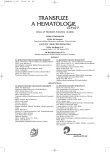-
Medical journals
- Career
Significance of immunotherapy with anti-CD20 rituximab and high-dose chemotherapy with autologous peripheral blood stem-cell transplantation in first-line treatment for mantle-cell lymphoma – centre experience
Authors: S. Vokurka; V. Koza; P. Jindra; K. Steinerová; V. Vozobulová; M. Schutzova; D. Lysák; M. Švojgrová; L. Mohammad; M. Karas; T. Svoboda
Authors‘ workplace: Hematologicko-onkologické oddělení, Fakultní nemocnice v Plzni
Published in: Transfuze Hematol. dnes,12, 2006, No. 4, p. 240-243.
Category: Comprehensive Reports, Original Papers, Case Reports
Overview
Mantle cell lymphoma is a lymphoid neoplasia with unfavorable prognosis, incurable by means of conventional chemotherapy. In 48 patients suffering with this lymphoma an effect of induction chemotherapy (CHOP-21 or intensified anthracyclines-based regimen by Th.Waits in 20/48 patients, CHOP-21 with sequential imunotherapy anti-CD20 rituximab in 18/48 and VAD+chlorambucil in 10/48) and an effect of autologous peripheral blood stem cells transplantation in 19/48 patients were analyzed. Complete remission was more often reached in CHOP induction regimen followed with anti-CD20 immunotherapy in comparison to anthracyclines-based regimens without anti-CD20 or compared to VAD+chlorambucil protocol (77 % vs. 30 % vs. 10 %, p = 0,011). The autologous transplantation further improved the number of complete remissions from 47 % to 94 %. With the median follow-up of 41 (12–116) months, in the whole cohort of patients, 79 % of patients relapsed/progressed with the median time to relaps/progression of 20 (2–66) months, and 59 % of patients died with the median overall survival of 30 (1–81) months. Despite intensified first-line treatment with autologous stem cell transplantation and addition of anti-CD20 immunotherapy, the prognosis of mantle cell lymphoma patients remains poor.
Key words:
mantle cell lymphoma, autologous transplantation, chemotherapy, rituximab
Labels
Haematology Internal medicine Clinical oncology
Article was published inTransfusion and Haematology Today

2006 Issue 4-
All articles in this issue
- Quality parameters of cryopreserved red cells reconstituted in AS-3 solution (Nutricel)
- Computer crossmatch - performance, validation and first implementation in the Czech Republic
- Indications of allogeneic and autologous haematopoietic cells transplantations. Recommendations of the Czech Socienty of Haematology and Czech Society of Oncology of the J. E. Purkyně Czech Medical Association
- The risk factors analysis in 248 patients with B-cell chronic lymphocytic leukemia at diagnosis
- Significance of immunotherapy with anti-CD20 rituximab and high-dose chemotherapy with autologous peripheral blood stem-cell transplantation in first-line treatment for mantle-cell lymphoma – centre experience
- Evaluation of antigen-specific lymphocytes anti-tumour effect with use of non-radioactive cytotoxicity test
- B-cell chronic lymphocytic leukemia Part III: Current conventional options of first-line treatment
- Transfusion and Haematology Today
- Journal archive
- Current issue
- Online only
- About the journal
Most read in this issue- Computer crossmatch - performance, validation and first implementation in the Czech Republic
- Significance of immunotherapy with anti-CD20 rituximab and high-dose chemotherapy with autologous peripheral blood stem-cell transplantation in first-line treatment for mantle-cell lymphoma – centre experience
- Quality parameters of cryopreserved red cells reconstituted in AS-3 solution (Nutricel)
- Evaluation of antigen-specific lymphocytes anti-tumour effect with use of non-radioactive cytotoxicity test
Login#ADS_BOTTOM_SCRIPTS#Forgotten passwordEnter the email address that you registered with. We will send you instructions on how to set a new password.
- Career

